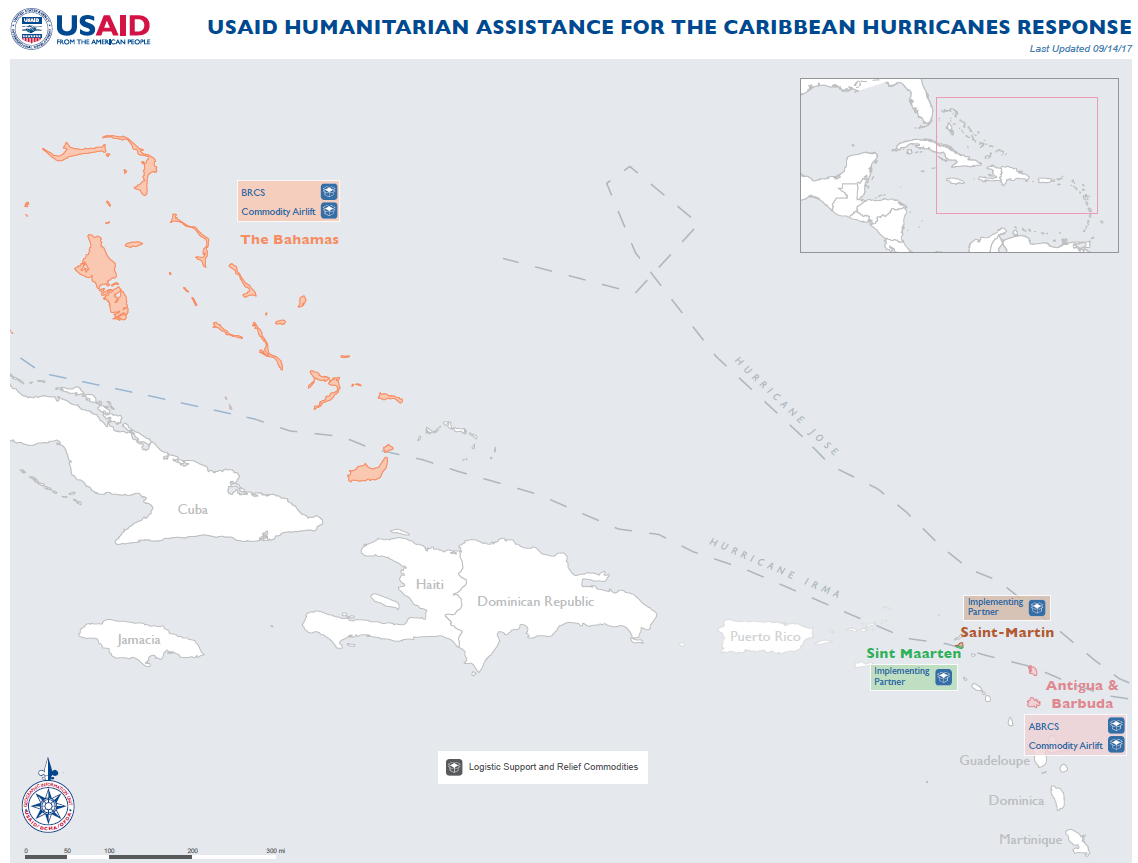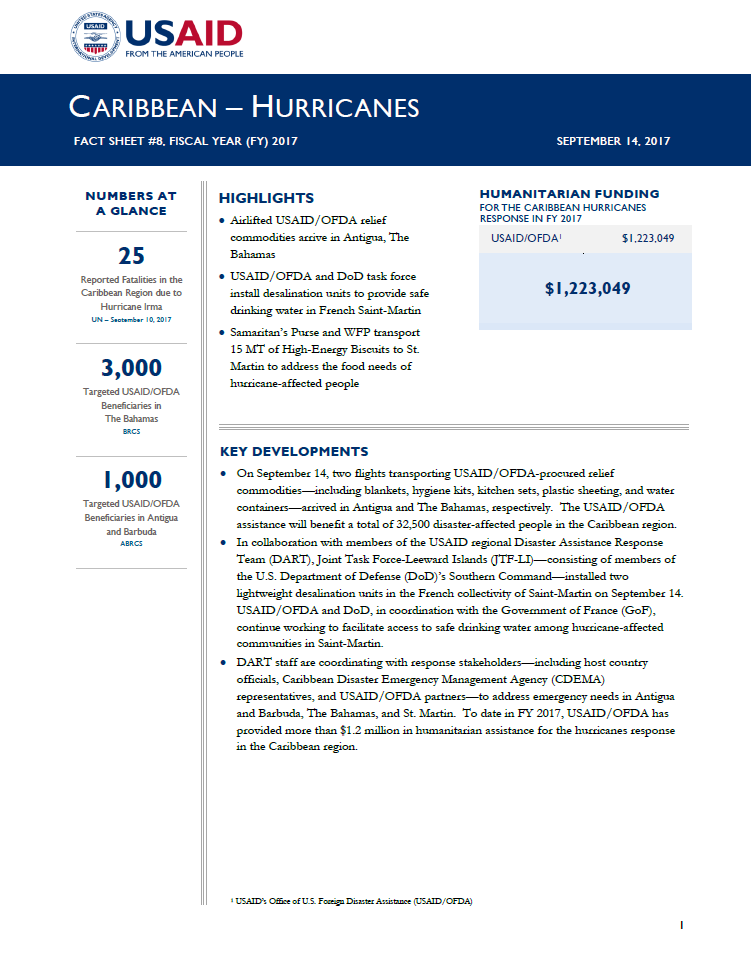September 14, 2017
Highlights
- Airlifted USAID/OFDA relief commodities arrive in Antigua, The Bahamas.
- USAID/OFDA and DoD task force install desalination units to provide safe drinking water in French Saint-Martin.
- Samaritan’s Purse and WFP transport 15 MT of High-Energy Biscuits to St. Martin to address the food needs of hurricane-affected people.
Key Developments
On September 14, two flights transporting USAID/OFDA-procured relief commodities—including blankets, hygiene kits, kitchen sets, plastic sheeting, and water containers—arrived in Antigua and The Bahamas, respectively. The USAID/OFDA assistance will benefit a total of 32,500 disaster-affected people in the Caribbean region.
In collaboration with members of the USAID regional Disaster Assistance Response Team (DART), Joint Task Force-Leeward Islands (JTF-LI)—consisting of members of the U.S. Department of Defense (DoD)’s Southern Command—installed two lightweight desalination units in the French collectivity of Saint-Martin on September 14. USAID/OFDA and DoD, in coordination with the Government of France (GoF), continue working to facilitate access to safe drinking water among hurricane-affected communities in Saint-Martin.
DART staff are coordinating with response stakeholders—including host country officials, Caribbean Disaster Emergency Management Agency (CDEMA) representatives, and USAID/OFDA partners—to address emergency needs in Antigua and Barbuda, The Bahamas, and St. Martin. To date in FY 2017, USAID/OFDA has provided more than $1.2 million in humanitarian assistance for the hurricanes response in the Caribbean region.
Caribbean Hurricanes - Map #8 ![]() (pdf - 300k)
(pdf - 300k)
Numbers At A Glance
25
3,000
1,000
Humanitarian Funding
For the Caribbean Hurricanes in FY 2017
| USAID/OFDA | $1,223,049 |
Caribbean Hurricanes - Fact Sheet #8 ![]() (pdf - 187k)
(pdf - 187k)
REGIONAL
Between September 13 and 14, a high-level Caribbean Community (CARICOM) delegation—including CARICOM Chairman and Prime Minister of Grenada Dr. Keith Mitchell and CDEMA Executive Director Ronald Jackson—visited hurricane-affected islands in the region, including Barbuda and the British Virgin Islands. During the trip, the CARICOM representatives met with local government officials, observed hurricane-related damage, and reiterated CARICOM support for ongoing response efforts in the region. To date, CDEMA—in collaboration with member states and regional and international partners—has deployed more than 90 response personnel to affected islands, including Anguilla, Antigua and Barbuda, the British Virgin Islands, and Turks and Caicos Islands.
On September 12, French President Emmanuel Macron visited the French territories of Guadeloupe, Saint Barthelemy, and Saint-Martin to evaluate hurricane-related damage and highlight GoF support for the ongoing response.
ANTIGUA AND BARBUDA
On September 14, a flight transporting nearly 65 metric tons (MT) of USAID/OFDA-procured relief commodities—including blankets, hygiene kits, kitchen sets, plastic sheeting, and water containers—arrived in Antigua for distribution to hurricane-affected families. A second USAID/OFDA-supported relief commodity flight is scheduled to arrive in Antigua in the coming days. Cumulatively, the commodities will address the immediate needs of approximately 17,500 people, including households in Antigua and Barbuda affected by Hurricane Irma, as well as families who may be affected by future disasters in the Caribbean region.
DART staff in Antigua continue to meet with the Government of Antigua and Barbuda, humanitarian organizations, and other response stakeholders to evaluate the priority needs of hurricane-affected households and coordinate USG response efforts.
THE BAHAMAS
A flight transporting more than 30 MT of USAID/OFDA-procured relief commodities—including blankets, hygiene kits, kitchen sets, plastic sheeting, and water containers—arrived in The Bahamas on September 14. The Government of the Commonwealth of the Bahamas National Emergency Management Agency, in coordination with relief partners, will manage distributions of the commodities—sufficient to meet the immediate needs of approximately 15,000 disaster-affected people—to hurricane-affected households, while stockpiling additional commodities for future disasters in The Bahamas.
ST. MARTIN
The Dutch military has established eight distribution points across Sint Maarten to provide Government of the Kingdom of the Netherlands (GoKN)-procured relief supplies—including bottled water, baby food, canned beef, canned vegetables, milk powder, and other items—to hurricane-affected families, the DART reports. Additionally, non-governmental organization (NGO) Samaritan’s Purse has distributed more than 3,400 blankets, 1,200 hygiene kits, and 1,200 tarps to affected households in Sint Maarten. The NGO has also imported four desalination units, as well as water containers to support distributions, to facilitate access to safe drinking water among hurricane-affected households.
On September 13, Samaritan’s Purse transported approximately 15 MT of High-Energy Biscuits (HEBs)—sufficient to meet the immediate food needs of an estimated 8,500 people for three days—from UN World Food Program (WFP) pre-positioned stocks in Haiti to the island of St. Martin. Samaritan’s Purse plans to distribute the HEBs to hurricane-affected people in Sint Maarten in the coming days.
Access to safe drinking water remains a priority need in areas of Saint-Martin, given hurricane-related damage to the French collectivity’s sole desalination plant, the UN reports. As of September 13, the estimated 1,000 residents of Saint-Martin’s Sandy Ground community were receiving only 3 liters (L) of water per person per day—less than the Sphere standard of 15 L per person per day for basic water needs, including cooking, drinking, and hygiene.2 In response, USAID/OFDA and JTF-LI are coordinating to import and install lightweight desalination units to facilitate access to safe drinking water in Saint-Martin. On September 14, JTF-LI installed two desalination units—with the combined capacity to produce approximately 13,630 liters of safe drinking water per day—in Sandy Ground. In coordination with USAID/OFDA and the GoF, JTF-LI is installing additional units to serve hurricane-affected households in remote communities of Saint-Martin, where the restoration of commercial water services may require several weeks.
DART staff, with support from JTF-LI, continue to coordinate with the GoF, the GoKN, local government officials, and relief organizations to identify and respond to priority humanitarian needs on St. Martin.
CONTEXT
Hurricane Irma—the strongest Atlantic hurricane on record—began affecting the eastern Caribbean in early September. On September 6, the hurricane made landfall over the island of Barbuda in the northeastern Caribbean before passing near The Bahamas, the Dominican Republic, and Haiti and making secondary landfall in Cuba on September 9. The hurricane brought destructive winds, heavy rainfall, and dangerous storm surge, resulting in at least 25 fatalities and causing significant infrastructure damage across the Caribbean region.
Between September 9 and 10, Hurricane Jose passed approximately 75 miles northwest of the island of St. Martin, causing less damage than anticipated in the Caribbean region. Damage and needs assessments following the passage of Hurricanes Irma and Jose remain ongoing.
On September 6, U.S. Chargé d’Affaires, a.i., Lisa A. Johnson issued a disaster declaration in response to the anticipated effects of Hurricane Irma in The Bahamas, and on September 7, U.S. Ambassador to Barbados and the Eastern Caribbean Linda S. Taglialatela issued a disaster declaration in response to Hurricane Irma and the anticipated effects of Hurricane Jose in Antigua and Barbuda. In response, USAID/OFDA is contributing an initial $100,000 each to the BRCS and the ABRCS.
On September 7, USAID activated a regional DART with staff in The Bahamas, Barbados, the Dominican Republic, and Haiti. USAID also stood up a Washington, D.C.-based RMT to coordinate the USG’s humanitarian response to the hurricanes.
On September 9, U.S. Embassy in Paris Chargé d’Affaires D. Brent Hardt issued a disaster declaration for the French Saint-Martin, and on September 10, U.S. Embassy in The Hague Chargé d’Affaires Shawn Crowley issued a disaster declaration for Sint Maarten due to the effects of Hurricane Irma and anticipated effects of Hurricane Jose. In response, USAID/OFDA contributed an initial $100,000 each for response activities in Saint-Martin and Sint Maarten.
PUBLIC DONATION INFORMATION
The most effective way people can assist relief efforts is by making cash contributions to humanitarian organizations that are conducting relief operations. A list of humanitarian organizations that are accepting cash donations for disaster responses around the world can be found at www.interaction.org.
USAID encourages cash donations because they allow aid professionals to procure the exact items needed (often in the affected region); reduce the burden on scarce resources (such as transportation routes, staff time, and warehouse space); can be transferred very quickly and without transportation costs; support the economy of the disaster-stricken region; and ensure culturally, dietary, and environmentally appropriate assistance.
More information can be found at: USAID Center for International Disaster Information: www.cidi.org or +1.202.661.7710. Information on relief activities of the humanitarian community can be found at www.reliefweb.int.









Comment
Make a general inquiry or suggest an improvement.